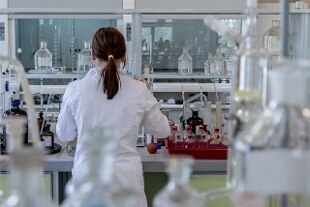- From the origins of the virus to the requirements of the vaccine: 5 questions still to be clarified 6 months after the pandemic
- Coronavirus, Trump returns to accuse China and announces: "Vaccine within the year"
- Maw: vaccine within a year and a half, devastating coronavirus like Spanish
Share
20 July 2020 The anti-Covid ChAdOx1 vaccine, developed by the Yenner Institute of Oxford University with the collaboration of the Italian Irbm, "induced a strong immune and antibody response until the 56th day of the ongoing experiment". The result is published in the Lancet magazine.These are preliminary results referring to phase 1-2 of experimentation which involved 1,077 healthy adults. "Further studies - it is said - are necessary to confirm whether the vaccine actually protects against Covid-19".
The article published in Lancet highlights "promising first results" regarding the ChAdOx1 vaccine, which is defined as "safe" and with "few side effects". Preliminary results have shown that in the sample of 1,077 healthy adult subjects involved in the trial, the vaccine was able to determine "strong responses" in the production of antibodies and immune T cells up to day 56 of the clinical trial currently underway. The answers, emphasize the Jenner Institute researchers on Lancet, "may be even greater after a second dose, according to a study on a subset of 10 participants".
However, the authors call for caution, stressing that "further clinical trials should be conducted on this prototype vaccine." The current results, they point out, are in fact focused on the laboratory-measured immune response and "further tests are needed to confirm whether the vaccine actually protects against Covid-19 infection".
Hope, first encouraging vaccine data but prudence
"Time and caution are still needed. But the first scientific findings on the University of Oxford vaccine, whose viral vector is made in Pomezia and which will be filled in Anagni, are encouraging. Italy, with Germany, France and the Netherlands are in the lead group for this trial. We continue to invest in scientific research as a key to defeating the virus. " This was stated by the Minister of Health, Roberto Speranza, after the publication on Lancet of the first results on the vaccine developed by the Jenner Institute with the Italian scientific collaboration.
Johnson, from Oxford very positive news
Boris Johnson commented via Twitter as "very positive" the news on the results of the first trials of the vaccine prototype being tested by the University of Oxford, currently considered the most advanced in Europe. The British premier addressed "a huge well-made message to our brilliant and world-class scientists and researchers from Oxford". The success and effectiveness of the vaccine "are not yet guaranteed," he noted, "but it is an important step in the right direction."
WHO, good news 2 vaccines that induce immune response
"Really good news comes from the publication on Lancet of the Oxford University vaccine data but also from the pre-print publication of the BionTech and Pfizer trial: it is really great to see these data , and we congratulate colleagues from Oxford University, Astrazeneca and BionTech and Pfizer ". The head of the World Health Organization's health emergencies, Mike Ryan, said at a press conference in Geneva, responding to reporters on the latest news regarding candidates for anti-Covid vaccines. "These vaccines - said the expert - did not cause serious side effects and generated neutralizing antibodies. These are positive results, but which still come from phase I studies, so we are waiting for further data. It is however important to see the progress of two of the 23 vaccine candidates currently in the clinical phase, "said Ryan. "We don't make mistakes: we must continue to accelerate the search for an anti-Covid vaccine - stressed the WHO director-general, Tedros Adhanom Ghebreyesus - while we do our best with what we have".

